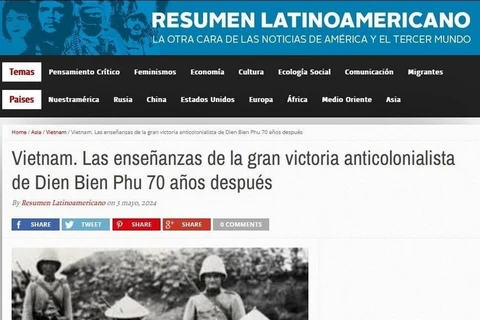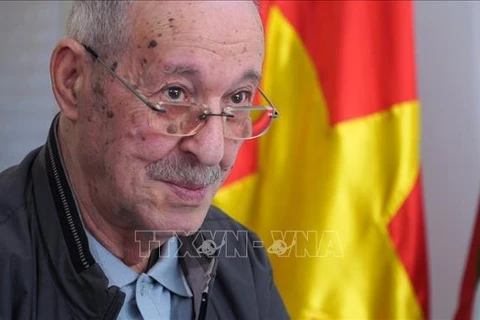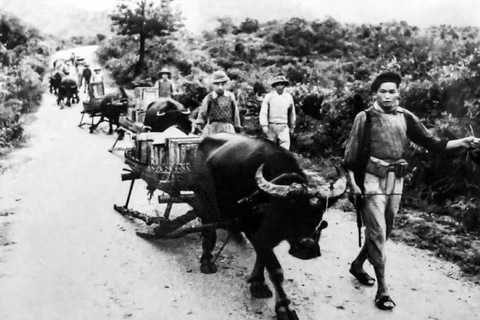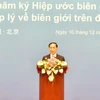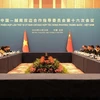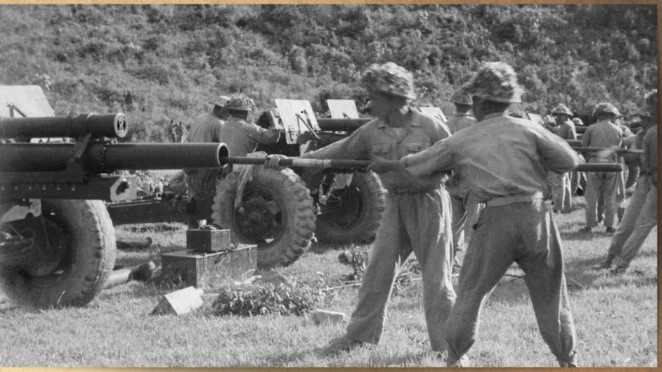
Hanoi (VNA) - On May 7, 1954, the Vietnamese army and people made the Dien Bien Phu Victory, which “resounded across the five continents and shook the globe”, ending 56 days and nights of their resilient and courageous fighting. The "invincible" Dien Bien Phu fortifications were completely wiped out by the Vietnamese army.
The Dien Bien Phu Victory had a strong impact on the anti-colonialism struggles of peoples around the world.
The Dien Bien Phu Victory is one of the pinnacle battles, the most comprehensive test of strength, and the fiercest fight between the Vietnam People's Army and the French colonialists with the interventions and support of US imperialists.
The victory caused old-style colonialism to collapse around the world, forcing the strategic planners of imperialist countries to shift towards new-style imperialism.
For Indochinese countries, this was not only a victory of the Vietnamese people, but also a victory for the Lao and Cambodian people who joined together to fight against the common enemy to liberate themselves.
The victory extinguished the will of the old-style colonialism, forcing the French Government to sign the Geneva Accords on Indochina, recognizing the national independence, sovereignty and territorial integrity of Vietnam, Laos and Cambodia.
Pasaxon, the official newspaper of the Lao People's Revolutionary Party Central Committee, has run an article affirming that the Dien Bien Phu Victory was very important for the Laos-Vietnam special solidarity and combat alliance because this was the victory of the two countries against a common enemy, and a demonstration of coordination and mutual support not only in the above campaign but also forever after.
That milestone opened a new era for the revolutions of Vietnam, Laos and Cambodia, making an important contribution to the national liberation movement and beginning the collapse of old-style colonialism worldwide.
For other colonial peoples around the world, the Dien Bien Phu Victory was a great encouragement as Vietnam demonstrated the ability of a small nation with rudimentary weapons to win the war against a powerful colonial empire equipped with modern weapons.
According to General Secretary of the Brazil-Vietnam Friendship Association Pedro De Oliveira, thanks to the encouragement from the glorious victory of the Vietnamese people over the French army, from 1954 to the late 60s of the last century, more than 40 nations gained independence from colonialism.Even before the battle in Vietnam ended completely, from April 28 to May 2, 1954, five newly independent Asian countries namely India, Myanmar, Indonesia, Pakistan and Sri Lanka met in Colombo, Sri Lanka, and decided to host the Bandung Conference, a meeting of Asian and African states in Indonesia in 1955.
A few months later, the resistance war to liberate Algeria began with many soldiers who had participated in the Indochina war. At the Bandung Conference in 1955, Vietnamese delegates were welcomed as heroes.
In an article titled "Dien Bien Phu: the birth and fate of a legendary hero" published in the Northwest magazine, historian Pierre Journoud wrote that related to the winners and losers at Dien Bien Phu, the answer is clear: Vietnam won and France lost.
On the Vietnamese side, the answer can be considered satisfactory given their huge sacrifices. This was an undeniable victory of the Vietnamese people, who made every effort and sacrifice to gain independence. Other colonial peoples benefited from the victory of the Vietnamese people.
Regarding the losers, 30 years after the battle of Dien Bien Phu, General Bigeard - one of the commanders in the Dien Bien Phu fortifications - briefly summarized: "The white race lost." The second losers were the French state and the dominant social classes it protected.
The British newspaper, The Guardian, once had an article titled “Battle against oblivion: the defeat that ended French colonial rule in Viet Nam”. At the beginning of the article, The Guardian affirmed that Dien Bien Phu was a disaster for France.
“Dien Bien Phu: three words that in France are still synonymous with a symbolic defeat. On 7 May 1954, after 57 days and nights of fierce fighting between Viet Minh troops and members of the French expeditionary force, the insurgents finally prevailed,” the article prescribed.
On May 7, 2014, French newspaper Le Monde published a series of photos with the title 60 years of the battle of Dien Bien Phu. In the introduction to the photo series, Le Monde newspaper wrote, “On May 7, 1954, the French army admitted losing the battle against Ho Chi Minh's Viet Minh. A symbolic defeat that led to the end of the Indochina War two months later.”
Ph. Leclerc, an excellent general of the French army, also spoke succinctly and clearly of the lesson from France's failure, "One cannot use force to destroy Vietnamese nationalism.”./.
